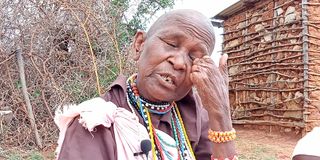Maasai ‘culture’ spreading trachoma in Laikipia

Ms Jane Tengeiyan Leparo, 61, a mother of six, speaking at her homestead at Doldol in Laikipia North sub county after recovering from trachoma.
Over the years, the Maasai community in parts of Laikipia North believed that having many houseflies in one’s homestead is a sign of wealth and booming yields from their livestock such as milk and meat.
Mr Joshua Rampei, a community health volunteer in Doldol town, says grassroots campaigns were underway to sensitise the community on the need to maintain hygiene in homesteads.
Mr Rampei, who is Maasai, says some cultural beliefs have precipitated the spread of trachoma, a disease caused by infection from the chlamydia trachomatis bacteria.
“The pastoralist community in this region believes that having many flies at the homestead is a sign of wealth. They don’t understand that the flies can be agents of spreading trachoma,” Mr Rampei told the Nation.
He said most parents do not wash their children after flies have crawled all over their faces. “We have been sensitising them to maintain high hygiene by regularly bathing using clean water. We always inform them on the signs of blinding trachoma and how they will be able to protect themselves from contracting it,” he said.

Mr Abdirashid Ahmed, 69, speaking outside his butchery at Doldol in Laikipia North after recovering from trachoma.
After delivering her third child, Ms Kanderi Lemari became blind from trachoma.
Ms Lemari, a resident of Murupusi village in Laikipia North, conceived three more children while visually impaired.
The 40-year-old woman suffered from trachoma for years, until 2016 when she was picked up from her manyatta (traditional Maasai homestead) by medical professionals and taken to Doldol Sub-County Hospital.
Between 2013 and 2018, Amref Health Africa partnered with the Laikipia government on a programme aimed at eradicating trachoma from the pastoral community.
When Ms Lemari was admitted to the hospital for surgery, her sixth-born son was three months old. She was among 1,500 patients in the county who underwent successful treatment under the programme.

Ms Kanderi Lemari speaking at her homestead at Murupusi village in Laikipia North sub county after recovering from trachoma.
“Since I underwent the surgery, I have never encountered any complications. I can now work and cater for my family easily. I was so happy to see all my six children,” Ms Lemari said.
Mr Abdirashid Ahmed, 69, operates a butchery in Doldol and suffered from trachoma for years. He was operated on in his left eye in 2018 at the Doldol hospital.
“At first, I thought some bone particles had entered my eyes because they were always itching and painful,” Mr Abdirashid said.
“I resorted to applying traditional herbs to help in regaining my eyesight but it was unsuccessful. Luckily, the surgery was successful.”
Ms Jane Tengeiyan Leparo, a 61-year-old mother of six, used to pluck off her eyelashes to ease the pain in her eyes. She had partially gone blind.

Ms Jane Tengeiyan Leparo, 61, a mother of six, speaking at her homestead at Doldol in Laikipia North sub county after recovering from trachoma.
In 2016, Ms Tengeiyan was in Soitaudo village in Laikipia North and was picked up by medical professionals from Amref and the county government. She was taken to the Doldol hospital.
The team traversed the village sensitising the community on the need to seek medical care for trachoma. Many members of the community had embraced traditional treatments, which did not help.
“I am appealing to people who have eye complications to seek medical attention before it is too late,” Ms Tengeiyan said.
“Most people in my community are ignorant and only go to the hospital when they become blind. None of my children have contracted the disease because I have always maintained the best hygiene standards.
“When I was growing up, my father had a lot of livestock and I think that is when I contracted trachoma.”

A boy infested by houseflies at a homestead in Laikipia North.
After recovering from trachoma, Ms Tengeiyan relocated with her family from Soitaudo village to Doldol.
Dr Samuel Irungu, an ophthalmic clinical officer at Nanyuki Teaching and Referral Hospital, said the chlamydia trachomatis bacteria is transmitted by houseflies from one eye to another.
The flies cause repeated infections, he said, and the bacteria scars the conjunctiva. The conjunctiva is a loose connective tissue that covers the surface of the eyeball.
“The scar makes the eyelid and eyelashes turn inwards. The eyelashes start rubbing on the cornea and cause discomfort,” Dr Irungu said.
“The cornea develops scars and starts turning white because of that scratching of the eyelashes. That is when we say a patient is blinded by trachoma.”
The cataract surgeon says surgery is the best way to eradicate the disease, but maintains that it should be conducted by a professional.
“When the patient has trachoma, we conduct reconstructive surgery to return the eyelids to their normal positions to stop the eyelashes from rubbing the cornea,” he said.
“The surgery is conducted to improve the comfort of the patient and drugs are prescribed after the procedure.”
He added that some people “conduct epilation or removal of the eyelashes from the patient to remove irritation and discomfort”.
“But the procedure is not reliable because new and sharper eyelashes grow again after a few months. The best way is to allow surgery from a professional,” he added.




